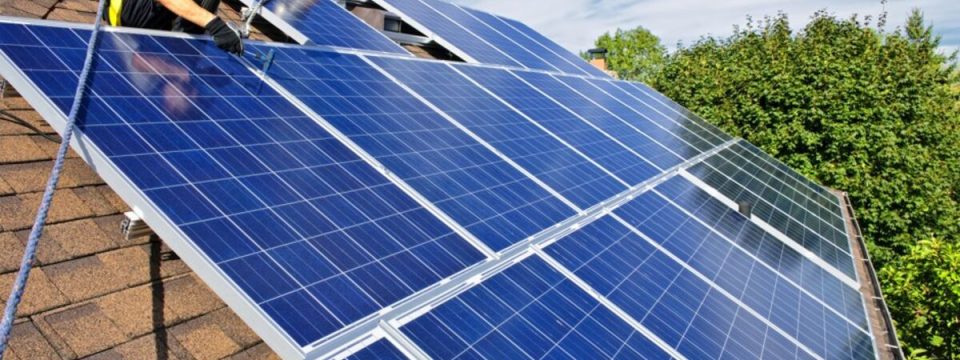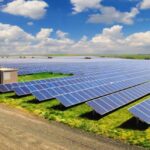In today’s world, where environmental concerns are becoming increasingly pressing, harnessing renewable energy sources has become paramount. Among these sources, solar energy stands out as a clean and abundant solution. Solar panels, also known as photovoltaic (PV) panels, play a crucial role in capturing the sun’s energy and converting it into usable electricity. In this article, we will delve into the fascinating world of solar panels, exploring their technology, benefits, and impact on our quest for a sustainable future.
What are Solar Panels?
Solar panels are devices made up of photovoltaic cells that convert sunlight into electricity. These cells are typically made from silicon, which reacts to sunlight and generates direct current (DC) electricity. The electricity produced can be used to power various appliances, lighting systems, and even entire buildings.
How Do Solar Panels Work?
Solar panels work based on the photovoltaic effect. When sunlight strikes the surface of a solar cell, it excites the electrons in the silicon, creating an electric field. This electric field allows the flow of electrons, generating an electrical current. This direct current can then be converted into alternating current (AC) using an inverter, making it suitable for household and industrial use.
Types of Solar Panels
There are different types of solar panels available, each with its unique characteristics. The most common types include monocrystalline, polycrystalline, and thin-film solar panels. Monocrystalline panels are known for their high efficiency and sleek appearance, while polycrystalline panels are more affordable. Thin-film panels, on the other hand, are flexible and can be used in various applications.
The Advantages of Solar Panels
Clean and Renewable Energy
One of the most significant advantages of solar panels is that they harness clean and renewable energy from the sun. Unlike fossil fuels, solar energy does not produce harmful emissions, making it an environmentally friendly power source.
Reduced Electricity Bills
By installing solar panels, homeowners and businesses can significantly reduce their electricity bills. Solar energy allows for energy self-sufficiency, as excess electricity can be stored or sold back to the grid.
Low Maintenance
Solar panels have low maintenance requirements, needing only occasional cleaning and inspections. Once installed, they can continue generating electricity for several decades.
Environmentally Friendly
Solar panels contribute to a greener planet by reducing greenhouse gas emissions and dependency on finite fossil fuels. Embracing solar energy is a crucial step towards mitigating climate change.
Solar Panel Installation
Location and Orientation
To maximize the efficiency of solar panels, proper location and orientation are essential. Ideally, solar panels should be installed in areas that receive ample sunlight throughout the day.
Mounting Options
Solar panels can be mounted on the roof, ground, or even integrated into building facades. The mounting option chosen depends on the available space and architectural considerations.
Connecting to the Grid
In grid-connected systems, excess electricity generated by solar panels can be fed back into the power grid, allowing users to earn credits or receive payments for the energy they contribute.
Solar Energy Storage Solutions
Batteries and Energy Storage Systems
Energy storage systems, such as batteries, are used to store surplus electricity generated by solar panels. These systems ensure a continuous power supply, even during cloudy days or at night.
The Environmental Impact of Solar Panels
Reducing Carbon Footprint
By producing clean energy, solar panels help reduce carbon dioxide emissions, which are major contributors to climate change.
Conserving Natural Resources
Solar energy does not require the consumption of water or fuel, unlike traditional power generation methods, thus conserving precious natural resources.
Minimizing Pollution
Solar energy production creates minimal air and water pollution, helping to preserve the environment and protect human health.
The Future of Solar Panels
Technological Advancements
The solar industry continues to innovate and improve the efficiency of solar panels. Advancements in materials and manufacturing processes will lead to more affordable and accessible solar energy solutions.
Integration with Buildings and Infrastructure
The integration of solar panels into buildings and infrastructure will become more seamless, allowing for greater adoption and sustainable energy generation on a larger scale.
Common Myths About Solar Panels
Solar Panels are Expensive
While the initial investment may seem significant, solar panel installations can lead to long-term cost savings through reduced energy bills.
Solar Energy is Inconsistent
Advancements in energy storage technology have mitigated the issue of inconsistent sunlight, ensuring a continuous power supply.
Solar Panels Require Constant Maintenance
Solar panels have minimal maintenance needs and are designed to withstand various weather conditions.
Solar panels are a remarkable technology that empowers individuals and businesses to harness the sun’s energy for a cleaner and sustainable future. By converting sunlight into electricity, these devices offer numerous benefits, from reducing electricity bills to lowering carbon emissions. As solar panel technology continues to advance, we can expect more widespread adoption and a greener world.
Are solar panels suitable for all regions?
Solar panels can be installed in most regions, making them a viable renewable energy option for many locations. However, the efficiency of solar panels may vary depending on the amount of sunlight a particular region receives. Areas with abundant sunlight generally yield higher energy output from solar panels.
Do solar panels work during cloudy days?
Yes, solar panels can still generate electricity during cloudy days, although their energy production may be reduced compared to sunny days. Cloud cover diffuses sunlight, leading to lower energy conversion rates. However, modern solar panel technology is designed to capture diffused light, ensuring a continuous power supply even during overcast weather.
Can solar panels withstand extreme weather conditions?
High-quality solar panels are built to withstand various weather conditions, including extreme temperatures, hail, and strong winds. Manufacturers subject their panels to rigorous testing to ensure durability and longevity. Additionally, proper installation and maintenance contribute to the panels’ ability to endure harsh environments.
How long do solar panels last?
Solar panels typically have a lifespan of 25 to 30 years or more. During this time, they can continue generating electricity efficiently. Many reputable manufacturers offer performance warranties that guarantee the panels’ efficiency over a specific duration, providing consumers with added peace of mind.
Are there government incentives for installing solar panels?
Yes, many governments around the world provide incentives, tax credits, and rebates to encourage the adoption of solar panels and renewable energy systems. These incentives aim to make solar energy more affordable and attractive to consumers, ultimately promoting a transition to greener and more sustainable energy sources.






